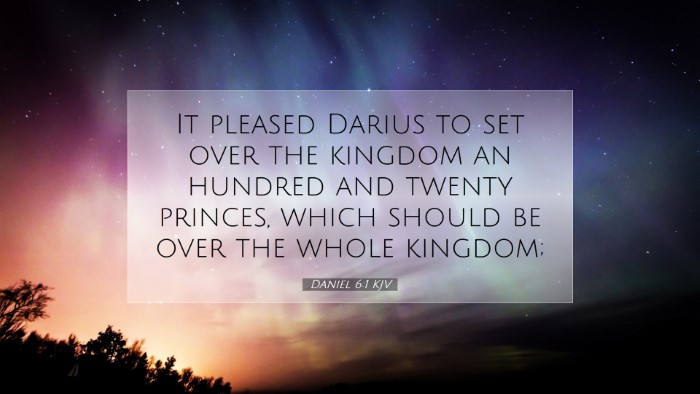Commentary on Daniel 6:1
Overview: Daniel 6:1 serves as a pivotal moment in the Book of Daniel, marking a transition into the later chapters that detail Daniel's experiences in the Babylonian and Medo-Persian empires. This verse introduces the political environment in which Daniel operates and sets the stage for major events that highlight his faithfulness to God amidst opposition.
Text of Daniel 6:1
"It pleased Darius to set over the kingdom an hundred and twenty princes, which should be over the whole kingdom."
Context and Historical Background
Historical Setting: The verse places us in the period after the fall of Babylon to the Medes and Persians. Darius the Mede, a ruler mentioned in this chapter, signifies the new political landscape following the Babylonian empire's demise. The establishment of governance through princes is indicative of Persian administrative practices, designed for effective governance over a vast empire.
Commentary Insights
Matthew Henry's Commentary
Matthew Henry highlights the Providence of God in appointing Darius as a ruler over Babylon. He notes that God raises leaders for the purpose of fulfilling His divine plan. Darius's decision to appoint 120 princes signifies not only a strategic move for political control but also a reflection of the wisdom that comes from God. Henry emphasizes that the management positions are critical for maintaining order in a newly acquired kingdom.
Albert Barnes' Notes
Albert Barnes elaborates on the structure of the governance established by Darius. He suggests that the appointment of princes over the kingdom demonstrates a hierarchical system that promoted order in administration. Barnes points out that the number 120 could symbolize a complete or comprehensive governance structure and was aimed at ensuring no part of the kingdom was neglected. He also underlines the significance of such governance in light of the ensuing events of Daniel's experience with the princes, foreshadowing the tests of faith and loyalty that follow.
Adam Clarke's Commentary
Adam Clarke brings attention to the character of Darius, examining his motivations and the implications of his decisions. His commentary notes that Darius's arrangement shows a wisdom that seeks not only control but also stability within the kingdom. Clarke points out that this structure was designed to facilitate efficient ruling over a diverse population. The mention of a system of princes may also imply the necessity for accountability, leading to the themes of integrity and righteousness that permeate the narrative of Daniel's life.
Theological Implications
- Divine Sovereignty: This verse displays the sovereignty of God in human affairs. The transfer of power from Babylon to Darius is a demonstration of God's authority over kingdoms.
- Preparation for Trials: Darius's decision leads to a backdrop of impending trials for Daniel. The framework of authority established becomes the arena in which Daniel’s faith is tested.
- Integrity in Leadership: The appointment of leaders reflects the need for integrity and accountability, themes that resonate throughout Scripture. Daniel's role as an administrator will highlight the contrast between worldly governance and divine principles.
Application for Today
For pastors, students, theologians, and scholars, Daniel 6:1 serves as a reminder of the importance of leadership in both secular and sacred contexts. The establishment of authority is significant not just for the stability of nations, but also for the functioning of faith communities. There is a call to integrity among leaders, echoing Daniel's example of faithfulness amidst challenging political climates.
Conclusion
Daniel 6:1, while seemingly introductory, is rich with meaning and implications. The careful actions of Darius, the structure of governance, and the ensuing events provide a profound backdrop for understanding how God's plans unfold within human history. The reflections from noted commentators serve to enrich our comprehension of this pivotal moment and challenge us to consider our roles as stewards of God's truth and authority in today’s world.


